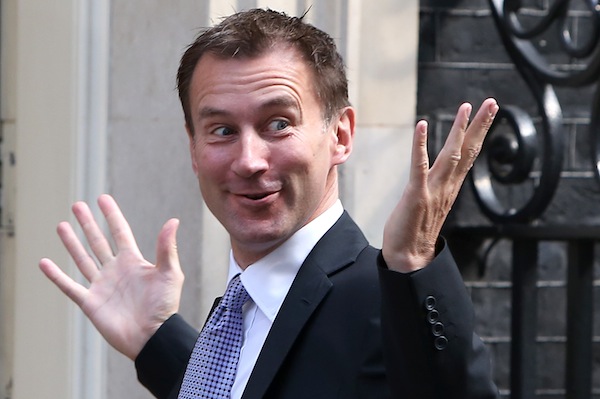When Jeremy Hunt became Health Secretary last September, the Google Alert I set up against his name would spew forth a regular stream of contemptuous comment on the new appointment. Invariably accompanied by an unflattering photo – quite often that one (above) where Hunt arrives in Downing Street looking less ready for a Cabinet meeting than as the stand-in children’s entertainer – the pieces conformed to an ordained boiler-plate. They would focus either on his Murdoch-stained record in office, or on the certainty that he was about to privatise the NHS out of existence or, failing that, on the general observation that here was another public school twit, capable of getting lost in the back of his own ministerial car. The best-crafted ones managed to combine elements of all three.
Today, however, Hunt’s media profile is rather different. The Google Alerts now tend to point in the direction of things the Health Secretary has said or done and less towards the achingly predictable reflexes of the NHS establishment. This is more than good fortune or circumstance. Even though the Prime Minister stole the limelight over Stafford – no doubt because there is nothing Cameron likes to do more than to apologise for things that aren’t his fault and declare his immortal love for the NHS – the fact that, as a political issue, this one is running in the Government’s direction owes much to Hunt’s careful preparation. Nor is he letting up. This morning sees him calling on the police to bring the responsible (or rather irresponsible) people at the Mid-Staffs hospital to book. The criminal justice system is yet another one that failed in this miserable tale.
When I say to people that I think we have a rather canny Health Secretary on our hands, they invariably reply that this is because he hasn’t said or done anything. This isn’t true. Hunt hasn’t said or done anything stupid (with the possible exception of his early comments on abortion, where he allowed himself to be lured into a swamp), but that is not the same as inactivity. On the contrary, he has quite deliberately set out on a different, and politically far more promising, path from his predecessor.
One example is Alzheimer’s disease, which Hunt has repeatedly said is his personal priority, backing these words with the mobilization of such bureaucratic instruments as are at his disposal. We can argue whether this is the right priority, as against obesity say, or cancer, but at least it shows the Health Secretary engaging with an actual issue of ill health, of concern to millions of people. Andrew Lansley, despite the clue in the job title, never seemed that much bothered about health. He was a structures man, consumed with his reforms and what they would do to improve ‘outcomes’. But real people don’t go looking for improved outcomes. They want to recover from their heart attack, or get relief from their arthritis or see the health and social services do their best for a parent with advancing dementia.
Then there is the matter of standards of care in hospital – the issue that reached a climax with the publication of the Francis Report on Stafford on Wednesday. Knowing that he was soon to publish the report, Mr Hunt made calculated moves from the start to bring the issue it deals with to the front of public consciousness. It may seem like a risky strategy, because we know how everyone loves their NHS; yet we also know that what happened at Stafford, though at an extreme end of the spectrum, has resonance for many many people who have either been in hospital themselves or had friends or relatives there. That the Stafford scandal happened under a Labour administration at the height of its spending spree also serves to undermine the central leftist argument on the NHS: that there isn’t a problem with the health service that cannot be solved by having a Labour government spending more.
It is far too early to declare that Hunt is a successful health secretary. There are plenty of things that can still trip him up and, besides, with the exception of Nye Bevan and, maybe, Enoch Powell, no health minister ever left the office with a higher reputation than when he went in to it. However, just as Michael Gove starts to wobble on his pedestal as the Cabinet’s golden boy, perhaps it is from an unexpected quarter that a challenger will arise.
Richard Marsh is a former special adviser to two Conservative Secretaries of State for Health.






Comments